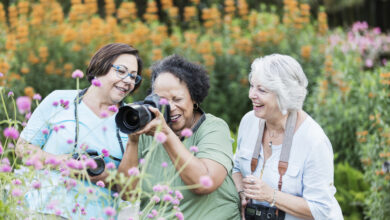Older people at risk from hot weather: Simple strategies for keeping cool

Although the winter months may typically be associated with heightened health risks for older adults, summer heat waves cause more deaths in Australia than all other natural disasters combined.
From thunderstorm asthma to heat exhaustion, as the mercury climbs, so do the risks.
For humans, the ability to cope well in extreme heat is associated with a strong central nervous system, which becomes less responsive over the age of 65, experts are reminding older people and their carers to take heat wave dangers seriously.
Sydney based general practitioner Dr Kim Loo offered her tips for beating the heat this summer.
“I ask every one of my patients if they’ve got a room to keep cool and prep one for that purpose,” Dr Loo said.
“You can do things like stick ice bricks, bottles of water, even wet towels into the freezer or in the fridge.
“Make sure you have an Esky that you keep cold things in just in case there’s a blackout, and make sure everything is charged like your phones so that way you can still call for help during a blackout.
“Stick to cold food and, if you don’t have air-conditioning, see if family or friends have one where they can keep cool during the day.”
Recognise the signs
There are three ways a person may die from hot weather; cardiovascular collapse, heat stroke or renal failure.
NSW Health director of environmental health Stephen Conaty highlighted the importance of being able to recognise the symptoms of heat-related illnesses and seek medical help early.
“[The signs] can include headache, dizziness, nausea and vomiting, fatigue and cramps,” Dr Conaty said in a statement.
“People with these symptoms should move out of the sun and seek shade or use a fan or air-conditioning, take a cool shower or bath if possible and take sips of water.
“It’s also important to check in on more vulnerable neighbours, friends and family to ensure they are OK.”
It is important to note that heatstroke brought on by hot weather is not associated with excessive sweating, rather the skin may appear hot, red and dry.
A person experiencing heat stroke may also present as confused or aggressive, have trouble coordinating their movements and/or have a dry and swollen tongue.
Do not rely on electric fans
Researcher Dr Fergus O’Connor from Griffith University’s School of Health Sciences and Social Work, recently led a study on the limited effects of using electric fans to cool body temperature of older people, he warns that heat related health risks increase significantly with age.
“As we age, we lose our ability to sweat, which limits the effectiveness of electric fans,” Dr O’Connor said.
“This can start happening from our 30s or 40s, but by our 60s there’s a significant impairment.
“The double whammy is, older adults also have a decreased capacity to sense heat stress, which can lead to dire consequences.”
The study examined the body core temperatures and heart rates 18 participants aged between 65 and 85, in an indoor environment of 36°C with 45 per cent humidity for eight hour periods, with and without using an electric fan.
Researchers found that, as a standalone cooling method, an electric fan may improve a person's perception of comfort, but does not result in a reduction of core body temperature.
“As we face more frequent heat events, these findings highlight the need for sustainable, effective cooling interventions that specifically address the physiological needs of older adults,” Dr O’Connor said.
“Particularly in the southern states where we often see hot, dry days of around 42°C at only 10 to 15 per cent humidity, any sweat is rapidly evaporated by the environment anyway.
“Using a fan in these environments just blows hot air across dry skin, which creates a heat effect, whereas in more humid environments such as tropical Queensland, a fan can at least help with evaporating some of that moisture off the skin and provide cooling relief, provided the ambient temperature is not too high.”
With the rising cost of living many older people may think twice about using air-conditioning, even if they have access to it.
“A lot of people will be hesitant to use an air conditioner due to high operational costs, so it’s important to look at more sustainable use of air conditioning,” he said.
“Instead of setting low temperatures and trying to fill the house with an arctic blast, set the temperature a little higher, around 26 or 28 degrees.
“Using the air con at a higher temperature in conjunction with a fan is going to provide cooling relief and significantly reduce the cost of operating the air conditioner.”
If air conditioning is unavailable, it is important to ensure other measures are in place to increase the effectiveness of an electric fan. The University of Sydney, in collaboration with the Montreal Heart Institute, has found that replicating the effect of sweat by wetting the skin can significantly reduce heat stress on the heart for people in hot and dry locations.
“While air conditioning is an effective way of staying cool, it's not available to everyone, especially those most vulnerable to the heat such as the elderly and people with heart disease – so it's positive news that low-cost alternatives are effective,” said co-author of the study Dr Daniel Gagnon of the Montreal Heart Institute.
“Importantly, the study has shown that the weather conditions affect the type of cooling strategy that should be used – a vital piece of information that will help older people to stay safe in heatwaves.”
Tips for tackling the heat
- Regularly sip on water or hydration drinks such as Hydralyte
- Practice sun safety by limiting exposure to the sun, wear light, loose fitting clothes, a hat and sunscreen if outside
- Avoid any strenuous activity
- Turn the temperature of air-conditioning up a few degrees to reduce running costs
- When only an electric fan is available, wet the skin to replicate the effects of sweat to cool core body temperature more effectively
- Avoid the consumption of alcohol
- Talk to your GP about medications, as some medicines may exacerbate dehydration or impede the body's ability to dissipate heat
Email: [email protected]






